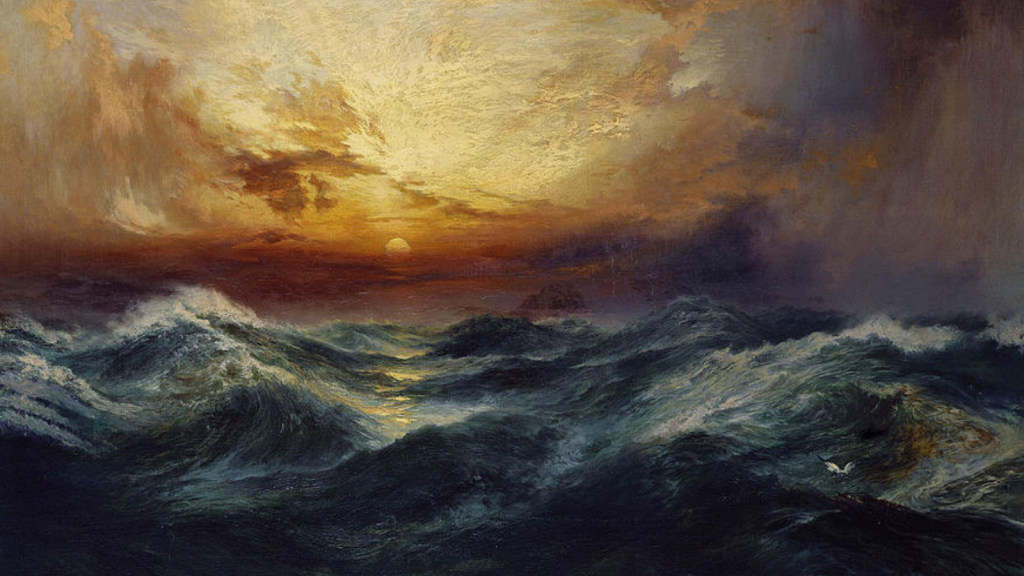I.
The gale seems to blow up out of nowhere just as the two of us are lumbering John’s dory into the river. Whipping past the headland, wind and rain sledge me in the chest. I’m shoved back, off-balance. Trying not to lose my grip on Selkie, I stretch out towards her from the landing, my feet slipping on a smear of pavement and sand. The small craft bucks and rears, alive in the water, wrestling to tear free.
Gusts knock me back again and then nearly off my feet into the churning water. I’m ankle-deep already, old tennis shoes submerged.
“Get yourself up,” shouts Spree.
Obeying as if I’m a proper sailor, I hook one leg over Selkie’s gunwale and bob into the air, half-way into the cockpit, only for the river, on a violent whim, to jerk the boat away again. Stalled mid-leap, wobbling, I fall back onto my other leg, thigh-deep now in water and muck. I’ve no leverage, no secure balance. My limbs are stretched asunder. Hopping on my toes, I’m already picturing the humiliating ass-back tumble, head and torso floundering beneath the waves.
John Spree calmly sidles my way, working his hands along Selkie’s flank. He lifts and launches me with a barreling heave into the stern. He follows quickly, pushing down on the wooden gunwale while clambering up and over. It isn’t decorous, but then John is a man in his fifties, twenty years my senior—and this was twenty-five years ago—and, anyway, the storm disdains any daintiness.
Practiced and efficient, in another moment he’s unlashing red canvas from the boom while I crouch out of his way, holding on, waiting for guidance or orders. John’s unruffled confidence does little to assuage my considerable doubts about heading out into such a blow as this, my belated introduction to storms on the River Exe.
After all, I never pretended any expertise of my own—he’s the one who called me. Only forty-five minutes earlier, I’d been warm and dry, grading essays at the university in Exeter.
“I need someone to crew,” he said over the landline (in 1992, landlines remained the rule). “You’ve been going on about wanting to sail, haven’t you? The wind’s brilliant today.”
“Yeah, I’d love to,” I said. “Of course. But I’m in the middle of office hours.”
“Office hours?” he barked, incredulous. “I may not be one of you university toffs, but I damn well know students in this country don’t expect their lecturers will be hanging about on the half-chance.” Disdain rang in his voice.
“But my Americans,” I pleaded. I was referring to the dozen college students in my charge for the year. But it sounded lame even in my own ears.
“Haven’t you been saying how you’re desperate to have a go, that you’re willing to crew anytime you’re needed?” he said. “If you say that to a man, you bloody well make yourself available. Know what I mean?”
I did know. This was by way of a test. And very British it was. If I didn’t accept his offer, another invitation would be unlikely.
From my window high on a hill overlooking this city in the south of Devon, I could see great whorls of oaks and beeches and firs dancing a mad folk dance, buffeted by wind even before the rain arrived.
“Look here,” said John, “traffic’s not so bad midday. You’ll be down to the water in half an hour. Tide’s just turning. Grab your waterproofs on the way.”
So I rush, to the extent our most ancient, most ugly of Ford estate wagons—a sickly canary yellow thing—can rush, four miles downriver to Topsham. My wife and I have rented a seventeenth-century fisherman’s cottage in this small town for the year. I swing by and snatch my rain gear from a hook by the door.
Twenty minutes later, a first mauling wave crashes across our bow, lashing me with spray and overwhelming the light fabric of a jacket designed for tourists. My shirt underneath and jeans, sodden, plaster against me like a second dermis. But there’s no time to notice the chill. Bent low, I’m gripping the rail and staring out from under the red mainsail. My glasses, also useless, are jammed into a pocket.
Open water greets us as we pound across the estuary. The landing we’ve just left no longer exists. And I know that the far bank lies a good mile across the way, though it’s invisible. For the moment there’s only a short horizon of driving rain and spray, with low clouds scudding overhead. No other sails, no other madmen, reveal themselves to port or starboard, upriver or down. At his post in the stern, John grips the tiller in one hand and Selkie’s mainsheet in the other.
In Norse tales, she darts seal-like through wild waters. Only on land does she yield to human form. Beneath us now, she bridles, half-wild, half-joyful. In truth, Selkie seems less a seal than a horse gathering to leap a hedge. My own heart is racing.
By trade John Spree is a bespoke tailor, and he’s also known to pick up a fiddle for the local troupe of Morris dancers. But in this gale, the wind and brine have scoured any markers of those identities clean away. His wet grey hair and beard, the weathered hide of his cheeks and strong nose, the set of his jaw all reveal different grades of iron.
Gradually, he draws himself up out of his seat, waves rushing beneath us as he arches his back. Aloft now, he’s bracing in his fist all the fury gathered in the red sail. The small wooden craft rears as well, flying forward, tight and free.
Breaking through cloud and spray, the far bank of the river suddenly appears. Is it possible we’ve come so far? The heavy thatch of mud and reeds is already looming with menace.
Unstartled, John calmly yanks the tiller hard into his chest. At once the sail luffs and the boat eases, swinging gracefully about. For a moment the storm itself seems tamer. Selkie wags her stern at the dark mud only a few yards beyond reach and then coasts safely back into the frothing channel, westerly winds now at our back.
“Here you go,” Spree shouts gruffly. That is, I see his lips move, but any sound is snatched away. I recognize it’s another test. Rather than admit either fear or inadequacy, I slide into the stern next to him and accept the tiller with my right hand, grasping the mainsheet in my left. Red canvas billows again. Selkie springs forward, though at my hand she’s more timid. The sail luffs, spilling air.
John is making his way forward, and I see him releasing the jib. Can we really handle more sail? Even as he unleashes it, the smaller sail explodes with impatience, as if lit by the gale. John grips the line tight and steady in his fist. For an instant he allows himself the pleasure of stillness.
To read more from David H. Lynn’s Auguries of Heavy Weather, purchase our Summer 2020 issue on this form.




